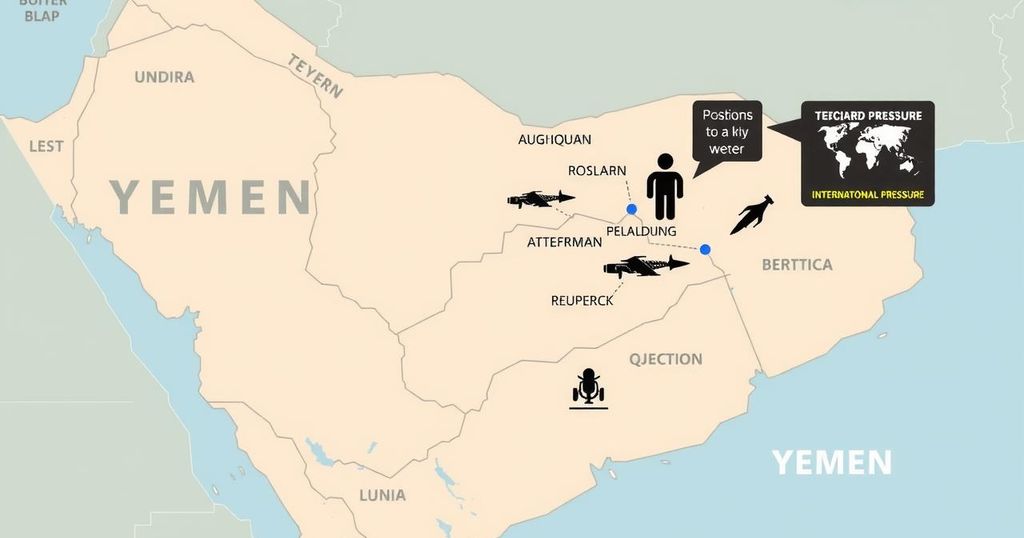Global news
ABC, ABDUL MALIK AL - HOUTHI, AMERICA, ASIA, CIVILIAN CASUALTIES, CONFLICT, DONALD TRUMP, HUMANITARIAN CRISIS, IRAN, ISRAEL, MIDDLE EAST, MILITARY OPERATIONS, NORTH AMERICA, OF SYDNEY, RED SEA, REUTERS, SANA ’ A, SARAH PHILLIPS, SAUDI ARABIA, TRUMP, UNITED STATES, UNIVERSITY, UNIVERSITY OF SYDNEY, US, YEMEN
Isaac Bennett
0 Comments
Analyzing US Military Operations Against Yemen’s Houthis: Context and Implications
The US has initiated a major military operation against Yemen’s Houthis following their attacks on Red Sea shipping, resulting in significant casualties. Houthi leader Abdul Malik al-Houthi has threatened retaliation against US vessels if attacks continue. The origins of the conflict stem from Houthi grievances and regional dynamics, which complicate international responses. UN officials advocate for restraint to avoid further destabilization and humanitarian crises.
The United States has initiated its most significant military operation in Yemen against the Iran-aligned Houthi group, a response to the Houthi’s attacks on Red Sea shipping which resulted in the deaths of at least 53 individuals, including five children and two women. The US military campaign may extend for several weeks, as indicated by a US official, in efforts to counter the threat to international shipping routes.
Houthi leader Abdul Malik al-Houthi has expressed intentions to target US vessels amidst ongoing US attacks, stating that the Houthis will escalate their actions if aggression persists. The tension escalates as the Houthis have positioned themselves in the broader conflict, framing their actions around the Palestinian cause, which, according to experts, enhances their legitimacy among local and regional populations.
The Houthis originally emerged as a Shiite Muslim faction, gaining control over Yemen’s capital, Sana’a, in 2014 amid a civil war. Their historical grievances stem from marginalization within Yemen and conflicts with both the Yemeni government and Saudi Arabia. The group has since leveraged regional conflicts, including those involving Israel, to assert their influence and provoke international engagement.
The US and Britain have conducted air strikes against the Houthis in response to their disruption of global shipping, asserting that maintaining navigational freedom in key maritime routes is essential for international trade. Amid claims that the Houthis were resuming naval operations due to unsatisfied humanitarian conditions in Gaza, the US has vowed to employ overwhelming force to protect shipping interests in the region.
Iran’s Revolutionary Guards have asserted that the Houthis operate independently and cautioned against US aggression, indicating potential retaliatory measures. Experts remain skeptical about the effectiveness of the US campaign, suggesting that the Houthis, well-versed in conflict, will adapt to the military pressure exerted by the US. The future actions of the US and its allies may significantly shape the ongoing dynamics in Yemen.
UN Secretary-General António Guterres has urged a cessation of hostilities, warning that further escalation could destabilize both Yemen and the broader region, exacerbating an already critical humanitarian crisis. The situation remains delicate, with calls for restraint emerging from various international quarters, as the complexities of external influences on the Houthis complicate potential resolutions to the conflict.
In conclusion, the United States has escalated military operations against Yemen’s Houthis, primarily in response to attacks on international shipping, which resulted in numerous casualties. The Houthis, who assert their struggle aligns with broader regional conflicts, continue to pose challenges to US and allied maritime interests. As tensions rise, international calls for restraint persist, emphasizing the urgent need for a resolution to the humanitarian situation in Yemen.
Original Source: www.abc.net.au




Post Comment